Jakarta, 12 November
Departure from the Royal Australian Air Force base in Canberra. The media flies before the prime minister who catches up later in a faster plane. The uniformed chaps with the high-gloss shoes greet everyone, this time at 3am, with a cheery good morning. Because it happens to be 3am this greeting is accompanied with laughter. The “at you†kind, not the “with you†kind.
It’s a typical departure in that everyone has a stress point. You can feel the centres of stress pulsing around the terminal. One colleague’s dog has vomited profusely in the kitchen. Another frets this is the best we are going to feel for at least a week.
In the blink of an eye we are wheels up, then a brief panic ensues when it appears two passports have been left behind. No drama, the passports are located.
TV crews huddle in the aisles and talk logistics. Fitful sleep is had. In what feels a short space of time we are thudding on the tarmac in the Indonesian capital. The heat hits like a fan-forced oven.
Our liaison person from the Department of Foreign Affairs and Trade, hovering with intent at the bottom of the stairs, is from the take-no-prisoners school, cheerful and practical, all precision, like the RAAF. We are blasting through Jakarta traffic with a police escort with a program in our hands which is locked down to the footnotes.
Pretty shortly it’s obvious why. Everything in Jakarta contains an element of mystery. The government and its apparatus does what it does. There is always the potential for things to slide off the rails. A fixed program must be reassuring in a post where mild incomprehension or outright frustration is occupational risk.
Having spent weeks nailing the program, DFAT (of course) thinks we are doing the program. Malcolm Turnbull (of course) has a different idea. When he lands, he’d like to do a short press conference. One senses the distinct sound of silent screams from the advancers. One can only sense the scream because the poker face is absolute.
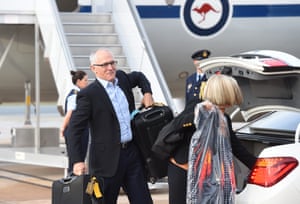
It’s an odd call by the prime minister. By speaking to the media before the events today, and with the time difference, at least for print editions and the TV news, he’s just made our one day in Jakarta actually about the rats-and-mice domestic political issues back at home. I wonder if he gets that? New boy. Rookie error. Given we are in Jakarta so the Australian government can reset one of our most important foreign policy relationships, you’d think we’d keep our collective line of sight on that.
We roar on to the presidential palace, which is a marvellous building in the grand colonial style. No-one in our media entourage is entirely sure what is happening because guidance is vague. The Indonesian media have been well briefed and swim like a school of fish in elegant formation. We visitors try to plug into the slipstream but lack a certain confidence. Confusion is inevitable.
There will be no remarks by Turnbull and his Indonesian host, someone tells us, which is awkward, given that’s actually what we came for. On the strength of that advice, most of the Australian press pack departs the scene. Later we learn there have indeed been remarks, which have to be chased.
David Bold, Turnbull’s senior media adviser, is a young man but an old soul. He’s from the human shock absorber school of press secretary, which in the combative world of Canberra in recent years, is a bit of a throwback. One suspects Bold could emerge from a nuclear blast, straighten his tie, and suggest we all go to the bar for a martini, but even he’s looking mildly disconcerted by Jakarta’s lack of fixed points, nothing is shared, but a little wrinkle forms between the eyes.
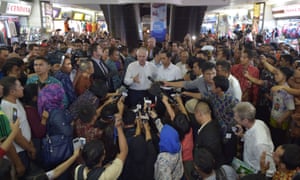
After the formalities at the palace, Joko Widodo and Turnbull go to a local textile market for a walk through – a “down with the people†opportunity the Indonesian president has never offered another world leader. David Cameron walked here, but on his own.
Much is made of this generosity. “Wonderful. Totemic.â€
Less is made of the fact the walk was actually the idea of the Australian ambassador, Paul Grigson, and the Indonesians have agreed, doubtless for their own domestic motivations.
Arriving at the market is a shock. Turnbull’s police detail take one look at the market and their profound objection to this outing is written all over their stony faces. You feel their attentiveness level climb by several notches.
I wait for the politicians at the bottom of a flight of steps. The crowd is swelling all around me, like a rising tide. It keeps coming, filling, spilling outwards, lapping the corners. The smart phones are out, children are being thrust forward.
There are too many people in this space. Too many blind corners. In theory, in the program, this event is a choreographed media opportunity, benign as hell. In reality we are right on the edge of the unknowable.
Turnbull senses the deep crazy as soon as he arrives. It’s baking hot. The leaders’ jackets come off. The Indonesian foreign minister grabs some paper towels for Turnbull, who is erupting like a drinking fountain. Jokowi of course is dry as a desert, and serene, executing one of his rituals.
The Indonesian security presence suddenly materialises and asserts itself, (where did they come from, so many of them) pushing people back, aggressively, particularly Australian cameras. I’m pushed back courtesy of someone being pushed into me and lose control of my own motion. It’s like being dumped in the surf.
The prime minister catches sight of me being tossed about. I can see his range of emotions immediately. Right now he is hovering on the edge of this sortie being complete insanity and the absolute best thing he’s ever experienced. Both feelings are there, behind his smiling sweaty face.
“Been for a bit of shopping Murpharoo?†Turnbull says, drolly.
A TV man swings in an arc to get out of the way of the people tide and clocks a security man with his camera. There’s a sharp collective intake of breath, we all freeze for a moment, but instead of getting handcuffs, the Indonesian extends his hand in forgiveness.
We make it out, and settle ourselves with a quick drink in the holding hotel. Turnbull is ebullient. Disaster or best thing ever? Well, it’s the latter of course. And it was an incredible experience.
He tells us he was so moved when a little boy in the crowd raised his hand to Jokowi to have the president hold it.
Turnbull is moved. The story is swelling within him.
Why is he moved I wonder? Probably because he’s a sentimental man. You do see this often. Turnbull’s emotions are pretty close to the surface.
But I wonder whether this is actually a politician and a bit of wish fulfilment. Hasn’t he, after all, just articulated the secret wish of every person in elected office, to be adored by the people? The hand of the willing supplicant, raised in adoration to the great man of history? It’s unknowable.
There’s no real time to wonder. We are doing what we always do on these trips. We are hurrying, only to wait. Out at the airport terminal, Jokowi regards us serenely from the wall. One of our party has fallen asleep on a coffee table. He is roused. Then we are flying through the night.
Berlin, 13-14 November
It’s been 53 hours since we left our beds in Australia. Our clothes from Jakarta wear the smell of the city and ourselves and our proximity to each other.
Our descent into Berlin brings a cluster of what Joe Hockey would have once described as offensive wind farms. The order of the city below us reassures after the chaos of Jakarta. Doors open brings a blast of late autumn cool air that feels like a tonic.
It also brings our new DFAT liaison person, who looks like he’s stepped from the pages of a conservative gentleman’s magazine: a caricature of a middle aged, cultured European. We are no longer in a hardship post. The plush mini vans purr on the tarmac.
Into the city, and we tumble out like a group of house bound pups at the Brandenburg Gate.
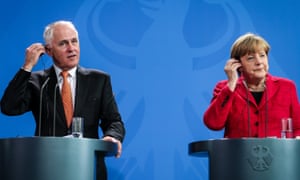
Sure there’s a monument there, but our local liaison would very much like us to keep moving. We are ignoring that, politely of course. He stands aloof, but censures us with his body, which he’s arranged in a stance suggestive of the hotel entrance, like a human sign.
Finally we comply. In the foyer, colleagues bump in to Tom Hanks and Steven Spielberg in Berlin for a press junket for Bridge of Spies. I bump into the prime minister and his wife Lucy who are in from their power walk. Both look pleased with the morning, and our digs, and the promise of our day. Neither has seen Tom Hanks.
Having refreshed, we are on the move to the chancellery to meet Angela Merkel, the most important figure on the continent. The Chancellery architecture is elegant. The Reichstag looms regally in the background.
Turnbull is slightly late. Merkel, being German, is early. She walks fast with a business-like gait. Turnbull lingers, taking it all in. You can see him commit it carefully to memory.
They do their talking, all build for the G20, signing off on the work that’s been done for months by an advisory group intent on improving the bilateral relationship. One person in the room tells me that in their tete-a-tete Merkel reasons and explains to Turnbull with experience and emotional intelligence, which I find an interesting observation about leadership in general and about Merkel in particular given the cliche about the German chancellor being dour and impassive.
Turnbull talks, inside and then outside at their press conference, a bit too much. There has never been a more exciting time to do anything and everything.
Lucy Turnbull stands as sentry, elegant, formidable. What she’s making of the Aussie stump speech in the chancellery is anyone’s guess. Does she ever think: for God’s sake, just shut up Malcolm?
We work, then we prepare for an evening at the embassy – a standard pit stop on these trips. Turnbull pulls us down to the lobby first for an aperitif. He’s full of the discoveries of the day. Collective energy is high, but our poor DFAT liaison is looking as though his world is about to end. We are due to be at the function, and these uncouth Australians are not proceeding in orderly fashion to the transport. Eventually we all bow to his acute personal discomfort. As we depart the lobby, well-heeled Germans look up from the low chairs where they are dining and socialising. We are so oversized and performative in pack formation they probably conclude we are Americans.
The night rolls on. Business people circulate at the embassy – the suits who want to build our submarines, career diplomats, spooks, movers and shakers perverse enough to be interested in the island continent far, far away.
Turnbull is shaking hands and eating finger food and talking about excitement, agility and disruption. I keep an eye on his circulation around the room, the deliberate arcs he’s making, the habits of a lifelong networker.
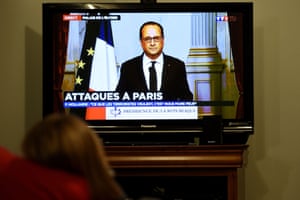
A bunch of us eventually move on to eat. We land in a pub with tall beers and meat off the bone and stodgy dumplings. We walk back to the digs to clear our heads of the day. The streets are cool and calm and full of the distant hum of a great European capital. The cool of the night soothes the wooze of the jetlag. It’s so peaceful. We break in different directions in the lobby.
In my room, and in all our rooms, the televisions would have gone on at roughly the same moment.
And there is Paris. Another set of streets in another great European capital suddenly seized with panic and carnage.
We are immediately in a different trip. Everything will be recast. It is not yet clear we will go to Turkey in the morning. Nothing is clear to anyone.
A photographer friend in our party promptly packs his bag and goes to Paris, chasing the story. His alternative is dull summit shots, so a human story wins every time.
The TV guys are required for live crosses and suit up and wire up. The rest of us watch, and wait and try to sleep.
Turnbull, jolted out of one set of imperatives and thrust into another, works through the night.
Turkey, 14-16 November
In a room at 5am, one of Turnbull’s senior advisers is telling us to be alert to the prospect of Australian casualties in Paris. No reporting yet please, this is not facts, this guidance is just prudent background. Very shortly afterwards, the injury of the young Tasmanian woman, Emma Grace Parkinson, is confirmed.
We are pushing on to Antalya and the G20. The only leader who is not is Francois Hollande. Turnbull will take flowers to the French embassy in Berlin before we go. The prime minister records some quick reactive grabs about Paris for TV consumption back at home. No questions. He forgets to tell us about the trip to the embassy. We see the gesture later recorded in the Twitter feed of the finance minister.
We’ve lost Bold on our plane and have been given one of the young media advisers to mind shop.
Team Turnbull is battening down the hatches to deal with events. Our collective rhythm – the trip tempo that lists intermittently between collegiality and carping, harmony and hostility – has fractured by necessity. We are in our separate spheres. We are flying into summit land.
It’s not just our trip that has been recast. All the entourages flying in to Antalya airport are now flying into a different G20. The airport has been purged of all humanity in order to provide a hermetic seal to protect the visitors.
It turns out Turnbull is staying at a hotel called the Titanic. We can’t help but laugh. Later, when we clear the elaborate security, and approach the prime ministerial accommodation, it proves to be a substantial five star pile with a waterslide bolted on the edge.
I think my eyes might be playing tricks so I ask whether anyone else sees a waterslide. I’m relieved they do. All the better for those spontaneous bombs into the pool performed by visiting world leaders. The laughter punctures the lingering sense of dislocation about the last few days.
When we see Turnbull again, his level of exhaustion is obvious. The angular planes of his face are like cliff sheers. In his first G20 bilateral with Shinzo Abe, he plays with his water bottle absently during a translation.
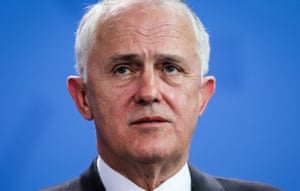
The TV crews come back from the Abe bilateral and one cameraman tells me there was nothing in the conversation, except something about the awarding of a multibillion dollar submarine contract but he didn’t quite catch it. What, I shriek, sitting bolt upright on the row of chairs where I have been, two minutes ago, dead to the world. What the hell? The cameraman roars laughing, mission accomplished. Serves me right.
Turnbull is going to do a live cross to Insiders very late in the evening. We are waiting to file in time for Australians sitting down to their breakfast.
Presumably he wants to get his post-Paris message out at home. Presumably too he wants to get his words into the domestic news cycle before Tony Abbott, who is doing the Bolt Report later on Sunday morning, and could easily be spoiling for trouble.
We pack up our makeshift camp and move out so the prime minister can move in to speak to Barrie Cassidy in Melbourne. Turnbull sweeps down the hall and past us into the recording room, staff trailing him, very slightly dishevelled, pale as the boss.
It’s moments like this where politicians can make real mistakes: moments of pure fatigue. But he doesn’t make any slips. Turnbull has either been ordered by the backroom to keep relentlessly to the agreed messages, to avoid the digressions that are the function of how his head works – or he’s bone tired and intuits the risks of extemporising in a time where tiredness intersects with terror.
We ask for a brief press conference. In an hour the interview will be broadcast in Australia and we will already be in a fresh news cycle by the time our words fly home across the internet. Such is the relentlessness of the modern news cycle we have to push him past his as yet unbroadcast comments.
As we’ve waited for Turnbull a diligent wire reporter in our group has noticed foreign ministers in Vienna have just managed to issue a set of principles for a political transition in Syria. The roadmap apparently has Russia’s acquiescence.
This is precisely what the G20 summit needs. There is a big push on for a political transition in Syria. I read this, not from Australian background briefings, but in the important newspapers of the world.
Australia meanwhile has been gearing up for another summit, one about trade and the economy, one superseded by the existential challenge of civil war and a bloodthirsty terrorist movement and humans fleeing the cauldron of horrors.
We mainly ask Turnbull about Vienna, and a news line emerges: we could send peacekeepers in the event the Vienna accord ever translates into reality.
I want to ask whether Merkel or Cameron have asked him to lobby Vladimir Putin, given he is a fresh face who has never publicly threatened to shirtfront the Russian president, but the advisers shut the press conference down.
Turnbull’s policy people have not yet seen the report out of Vienna, which is mildly odd, and registers as odd, but we are tired, and racing to file, and I for one make an assumption the attention of the backroom has been diverted elsewhere. None of us are sharp enough to ask why this is news to the Turnbull backroom.
The “why†emerges the next day in a report from The Conversation’s Michelle Grattan. The Russians did not want us in the room at Vienna. Just regional powers and the big boys, thanks very much. It’s a good insight, which while not a snub, neatly underscores our middle power status.
Turnbull’s people won’t blab about machinations behind the scenes – no-one in international relations tends to speak before Washington has spoken – but logical deduction suggests we are using our military contribution in the Middle East to prise our way back in to the Syrian conversation. Or we’re trying, in any case.
There’s a faint whiff of Kevin Rudd in that kind of Aussie audacity. A bit more Rudd in the arduous nature of this program.
A bit more still in Turnbull’s full tilt race for the future. Another time zone surfing internationalist with big ambitions for the country and his moment in it.
There’s a bit more Rudd in the fatigued faces of the Turnbull backroom riding the momentum of a leader with a cathartic sort of initial connection with the Australian public.
Once, years ago, I wrote a piece where I compared Kevin Rudd’s young political staff to the Lost Boys of Peter Pan. They rode into government with such energy. Not all political offices have energy. Some have stature. Some have dysfunction. Some have incompetence. This Turnbull office is arriving with the carpe diem tempo of the Rudd office in 2007.
It’s hard to shake the sense I’ve seen this before, except the Turnbull office has considerably more grey hair in key roles, and I suspect there’s more personal loyalty here among the stayers who have seen Turnbull through his various professional bumps in the road. The stayers in his entourage can anticipate his needs and translate them from across a room.
But it’s a perishable business. I think of the Rudd office, who lived through the miserable Rudd/Gillard divorce before scattering back out into the world. Only by virtue of being round long enough to see cycles repeat, you can sense these Turnbull people trying not to look too far ahead, yet wondering all the same.
The rest of the G20 is on the bus, off the bus, to the bilateral, from the bilateral.
I make one big sortie into the heart of the summit zone. Barack Obama’s “beast†is idling in the driveway and snipers prowl on on the rooftops.
Speeding though a designated meeting zone, I spot Cameron gripping and grinning with Abe. There’s a sudden commotion in the hallway. In sweeps Putin and Xi Jinping, followed by a fawning delegation so cartoonishly large it looks like a subway attendant may be called up to shove people into the commuter tram. How the door shuts is anyone’s guess.
Turnbull barely makes eye contact with our reporter’s pool as he powers through to meet Modi of India.
They have really disappeared into the locked box of this place. Communication is a bit erratic, and incipient fractiousness between the spinners and the scribes starts to bubble.
Bold, the human shock absorber, absorbs the angst and all the gratuitous advice about how he could be a better slave to our whims with his usual implacable calm.
I step briefly out of my transactional self to make a mental note that he’s strictly humouring here – he will stick with the program of the boss without feeling the pressure of conforming to our rituals and our demands, many of them petty and perishable.
Then I notice Bold is swaying, ever so slightly, his thumb twitching over his phones. His professional mask is fixed, the affability unshakeable, but his body is starting to give him feedback that this is all a bit stretched tight.
He’s just waiting patiently, presumably in the entirely reasonable hope we will shut up and leave.
We leave him with the snipers standing with his two smart phones by an oversized water park which looks a little like Disney World on the Mediterranean.
I give him the dignity of not turning around to check whether he sits down once we are safely away.
Manila, 17-19 November
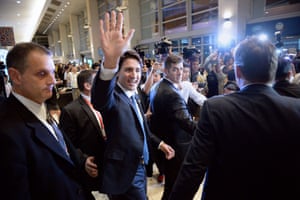
In Berlin, the resident hotel celebrities were Tom Hanks and Steven Spielberg. In Manila, it is the new Canadian prime minister, Justin Trudeau.
Australian journalists are idling like parked cars in the foyer of the Peninsula Hotel, which is festooned with premature Christmas decorations. A small orchestral ensemble pumps out carols and pop ballads on a mezzanine balcony above our heads. Right now they are playing Bryan Adams.
We are waiting for Turnbull but soon learn everyone else milling about in the foyer is WFT: waiting for Trudeau. Soon enough the doors sweep open and the new man in Canada strides in to the foyer in the full expectation that a crowd will be waiting for his entrance. Trudeau pauses momentarily like royalty before lifting his arm high in salutation.
Trudeau hasn’t even scanned the room before the royal wave. As far as he knows, he could be gesturing to no one, but here is a person entirely conditioned to public life, like a supermodel who knows how to work the light or an actor hitting his mark.
I burst out laughing at this supreme self-confidence. An Australian prime minister would never approach a room with such a relaxed sense of entitlement.
I remember Turnbull, back in Jakarta with that anecdote about the child’s spontaneous devotion to Jokowi. My people, my people. Eva Perons in their secret hearts, all of them.
At the other end of the spectrum is John Key. I miss this event but colleagues later report that shortly after Trudeau, a hotel guest is spotted in the foyer in his bathrobe.
This guest turns out to be the New Zealand prime minister, who is coming back barefoot, terry towelling loosely knotted, from the hotel pool.
After they recover their equanimity (prime ministers in bathrobes in public thoroughfares are, let’s face it, a reasonably rare sight), my colleagues subject Key to a quick interrogation. How do you like Turnbull, one asks? “He’s a bolter,†Key replies, cheerfully.
Languid in different fashion is Barack Obama, our first official port of call in Manila. To get to him we must enter the Apec security zone, then enter the American security zone, which includes an x-ray truck the Americans have flown in to inspect any vehicle with the temerity to enter their locked down area near the Soffitel.
Then we must enter the enormous purpose built tent the Americans have constructed on the grounds of the Sofitel to conduct their business. The Americans have arrived for Apec en masse like nomadic desert princes making camp on Manila Bay, except this is not conformance with ancient custom, my working assumption is they are avoiding any prospect of being bugged.
The Americans want us all to line up for the bilateral in single file, with cameras first, then TV journalists then print. I don’t tell them I’m digital for fear of any abstract unintended consequences, ranging from extraordinary rendition to being told to sit in the foyer until after the bilat.
Orderliness is a worthy aspiration. Problem is Australians just don’t line up. I ask our fresh faced American wrangler whether this is some quaint American custom: a daily procession of obedience. His presence in a hardship post, coupled with the resigned expression, suggests I’m not the first Australian smart arse he’s encountered. “It just looks nicer on the broadcast,†he says, patiently.
Naturally it is beyond our collective capacity to be orderly. A few more attempts are made, with added shooshing, before the process is abandoned. To be fair, the Americans are not obeying either. They, like us, have flown in overnight from Turkey. Perhaps we are all wandering around like Brown’s cows to stave off deep vein thrombosis. “Christ I need a shower,†one rumpled print man says to another.
We burst in as the door opens. Obama has that elegant looped limb position you’ve seen a thousand times in bilaterals from around the world. His hands don’t open, the long fingers rather unfurl and frame a cheekbone.
When we are all in position, the US president speaks very quietly, like it is our job to lean in in order to hear what is being said. The American president is always heard, with or without amplification, because the world has been conditioned to lean in.
Turnbull listens politely and doesn’t fidget. But as soon as the Obama spiel has concluded he smiles, flicking the hem of his suit coat as if he might leap up and deliver a closing submission to an international tribunal.
Turnbull then projects like an operatic tenor to the back of the room. This is the only way an Australian prime minister ever gets heard: by speaking up.
Obama, like everyone, gets the Turnbull stump speech. As usual, he speaks too long. The president responds with absolute poker face, and periodic nod of affirmation. Lecturing an American about the wonders of technological disruption is a little like lecturing Eskimos about the utility of ice, but that’s the spiel. I picture Obama and Merkel texting one another. BO: What is it about this new Aussie and the obsession with the relative youthfulness of Microsoft? AM: You tell me, Barrie. PS: Take your bugs when you leave this time.
Later that night, Turnbull is back with us at the hotel. He looks much better, out of the worst of that gruelling time between Berlin and Antayla. The effort they are making to keep in touch during the trip shouldn’t be underestimated. Speaking to us regularly costs him preparation time, or rest. The contact with him is not even really spin, for him these sessions runs like live feedback. What did we all think, how did it look. Rather than framing his actions, he’s surveilling us in a way, watching our habits. Individuals he knows, the valuable intelligence for him is the dynamic of the group.
The foreign minister, Julie Bishop, is by his side. They are dining together tonight.
Bishop is attentive and rigorously on the clock while feigning she’s participating in a spontaneously convivial social wind down. Politicians spend their lives in these social situations with everyone wanting a piece of them so they learn to both project and withhold, usually simultaneously. Women always have to be better, sharper, more guarded, more dexterous than the men in line before them.
A beverage slips and drenches her shoes. She doesn’t miss a beat, continuing the conversation while dabbing at the shoe, which comes off to dry. She balances on one stiletto with ease.
Turnbull talks, she regards him out of the corner of her eye while maintaining her own flow of conversation. I suspect this multi-channelling is a skill she’s acquired in her diplomatic portfolio, although it’s got a touch of the managing partner about it as well. Does he know she’s watching him and and talking to someone else at the same time? Does he feel her attention, or is this something only another woman would detect because a man, particularly a powerful one, would just assume all the attention is trained on him.
I wonder if her affable vigilance is a kind of shorthand between them, a constant reminder not to overshare. Standing in this room in Manila, they are a human check and balance.
Neither over share, nothing out of school, but they set up various arguments they will make publicly and in some detail the next day about the political transition in Syria. Nothing explosive. All pretty obvious, but when surrounded by the great powers, it’s always best for the middle powers to mind their manners and let the grownups speak first. Probably best too to have journalists prepared if you want to launch into complex material they may or may not be across.
The subject of the Thucydides trap – where an existing superpower feels threatened by an emerging power – comes up. This might seem odd but in any conversation with the prime minister, the Athenian general is often not far away. Great power and rising power tensions is the highly specific universe we are inhabiting at this particular Apec, wedged between China and America, and the ancient Greeks knew something of that dynamic.
President Xi has made speeches referencing the phenomenon known as the Thucydides trap in analysing China’s place in the world. Last year Xi said “we all need to work together to avoid the Thucydides trap – destructive tensions between an emerging power and established powersâ€.
Xi’s public statements prompt me to wonder whether Turnbull and the Chinese president could, bizarrely, bond over something as random as Thucydides. It’s a funny universe, the highly managed and mediated universe world leaders inhabit.
We are all searching for our various connection points, managing our competing imperatives and friction points. Turnbull in his bilaterals. The scribes with the prime minister and officials – them with us. Working through these social rituals.
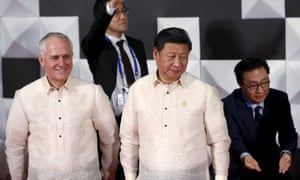
Apec, meanwhile, rolls on. Trudeau continues with his spectacular hotel entrances. When I glance up from a conversation, he’s indulging a mass selfie in front of the hotel Christmas tree.
I get my own moment with John Key, fully clothed, in a restaurant at the hotel. He wanders past with his staff. As I’m bidding farewell to an Australian official Key knows well, the NZ PM stops and I have opportunity introduce myself. Culturally he’s very familiar.
He has a laugh about the internet going crazy with a comment from Obama that was picked up by a boom mic during the leaders meeting. “So, you, er, actually talk to the New Zealanders,†Obama is heard saying to Turnbull. Turnbull responds earnestly. Of course he does. Key is a role model. Obama cracks up, telling the Australian he and Key are great pals. Golfing buddies in fact.
Key thinks this is hilarious. He whips out his smart phone to show me this story is currently the lead on the major news website in New Zealand. A good day, the New Zealander thinks, quite the lark. Well fed and internet famous, Key moves on.
Turnbull is on his way to the final summit. Key is about the follow him. The Australian officials are folding their camp in Manila. Some are returning to Australia. It’s time to go home.






 Add Category
Add Category
